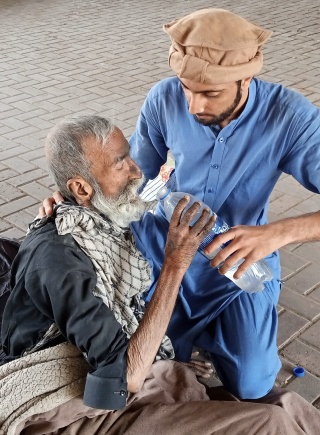Freeing Up for Mission: Critical Steps for the Path Forward
Early Memories

Editor's Reflections: Forming Disciples who Make Disciples
 It was yet another miraculous catch of fish.
It was yet another miraculous catch of fish.
Sanctifying Your Spending
If you were being investigated and the detective had access to highly detailed records of your personal income and spending, what would this evidence reveal about your Christian commitment? How does your credit card transaction registry provide a clue to the seriousness of your Christian faith?
Do these questions sound strange? Oftentimes we aren’t very thoughtful about the relationship between money and faith, yet the way we spend our money reveals quite a bit about who we are and what we value.
Youth & Young Adult Ministry: The Use of Media in Youth Ministry
It’s no secret that over the past year the use of media has become a near necessity, causing its importance in our youth programs to skyrocket. The conversation about what it looks like to effectively use media within the realm of youth ministry is more paramount today than it has ever been in the Church’s history.
There is certainly no lack of differing perspectives when it comes to the best media practices, and there’s not necessarily “one right way” to engage with the youth culture through media. But there are most definitely some dangers in regard to the use of media within youth ministry as well as some practices that can help us become lights in the lives of our young people.
From the Shepherds: The Paradigm of Mercy in the New Directory for Catechesis
 On June 25, 2020, the Pontifical Council for the Promotion of the New Evangelization, headed by its president, His Excellency Archbishop Rino Fisichella, presented for the Universal Church a new Directory for Catechesis.
On June 25, 2020, the Pontifical Council for the Promotion of the New Evangelization, headed by its president, His Excellency Archbishop Rino Fisichella, presented for the Universal Church a new Directory for Catechesis.
Ennobling Human Culture
In his encyclical letter Redemptoris Missio, John Paul II makes the claim that “since culture is a human creation and is therefore marked by sin, it too needs to be ‘healed, ennobled and perfected’” (John Paul II, Redemptoris Missio, no. 54).
The Intellectual Backstory
Like many statements in ecclesial documents, one needs to know the intellectual history behind the statement above—the “backstory” as it were.
Here part of the backstory is the Romantic-era approach to the subject of culture, including the idea that every national group has its own culture and that each and every national culture is equally of value. In other words, it is a typical Romantic argument that no one culture is superior to another, all are of equal value.
Many people unreflectively adopt something like the Romantic approach because they have a memory of one particular culture (or anti-culture) trying to assert its superiority using tanks and aircraft bombers and gas chambers.
A Catholic theology of culture is, however, radically different from the Nazi ideology of culture. The Catholic vision has absolutely nothing to do with conceptions of racial superiority. Genetics has nothing to do with it. The Catholic conception is all about grace and how some human practices are more or less open to grace than others and thus some cultures are superior or more noble than others because they are more open to grace than others.
Since Catholics believe that all human beings are made in the image of God, whether they are born in one of the culturally sophisticated suburbs of Paris or in a village somewhere that has yet to obtain Wi-Fi, they all begin their lives with the same status before the throne of the Holy Trinity. In this sense the Catholic faith is both universal and egalitarian. Baptism does not recognize class distinctions. Once a person has been baptized they are a member of the Royal Priesthood. As the Orcadian Catholic writer George Mackay Brown poetically explained in his short story “The Treading of Grapes,” in heaven Christ will address his friends with the royal titles Prince and Princess. However, what Catholics do with the gift of their baptismal graces will have an impact upon their own nobility or lack of it, and upon their social practices and their culture. Those who are the most saintly are the most ennobled.
AD: Study Guides, Online Saints and more from OSV!
Order today from OSVCatholicBookstore.com or wherever books are sold. For parish orders, visit OrderOSV.com.

This is a paid advertisement in the January-March 2021 issue. Advertisements should not be viewed as endorsements from the publisher.
RCIA & Adult Faith Formation: Do Your Catechumens Know Jesus Gets Them to Heaven? Part 1
Since becoming Catholic in 2004, I have encountered many, many Catholics who do not understand grace, salvation, or how they are granted access to heaven. Many have revealed they live in fear of going to hell because of some unknown, unconfessed sin or that their understanding of how they are saved is solely based on their works. These Catholics do not understand how faith and works relate to salvation. In short, they do not understand the source of their salvation.
Dr. Peter Kreeft explains the problem in his book, Catholics and Protestants: What Can We Learn from Each Other?[1] Throughout his years of teaching philosophy at Boston College, he would ask students, “if you were to die tonight and meet God, and God asked you why he should let you into heaven, what would you answer him?” He usually would receive one of three answers:
- I’m a good person (Pelagian, self-salvation)
- I hope in God’s mercy (presumption)
- Jesus Christ
He goes on to say that 0 to 5 percent of Catholics cite Jesus as the source of their salvation, and place it mostly on works, but that nearly 100 percent of Evangelical Protestants cite Jesus as the source of their salvation.
If catechumens and candidates do not clearly know that Jesus is the source of their salvation, and how works are related to it, we run the risk of creating works-based Christians who are not converted in heart and incapable of persevering until the end (Mt 24:13, CCC 161).
What follows is part one of two of an overview of how an adult moves from being unsaved to saved (and saved to unsaved) and the relationship of grace, faith, and works. Namely, what are the ordinary means of grace for salvation? Part one will focus specifically how one becomes saved and part two will focus on how one can lose salvation. For the sake of space, I am leaving out the exceptions to the normal process of salvation, since those who receive exceptions are known to God alone (CCC 848).
AD: Free Downloadable Bi-lingual Discipleship Quad Kits
To learn more about and to download the free Discipleship Quad Kit in English click here, and in Spanish click here. Or call 740-283-6315.

Children's Catechesis: Students, Families, and Evangelization in the Catholic School
Evangelization is a primary function of Catholic schools. Although they provide quality education in a variety of subject areas, as agents of the Church, they share the larger mission of the Church: forming disciples of Jesus Christ. Catholic schools should and must be more than public schools that also happen to have religion classes. Speaking about the role of the Catholic school, the Vatican II Declaration on Christian Education, Gravissimum Educationis states, “But its proper function is to create for the school community a special atmosphere animated by the Gospel spirit of freedom and charity, to help youth grow according to the new creatures they were made through baptism as they develop their own personalities, and finally to order the whole of human culture to the news of salvation so that the knowledge the students gradually acquire of the world, life and man is illumined by faith” (8). A key role of the Catholic school, then, is as an agent of evangelization.
Schools can live out their mission to evangelize in a number of practical ways, including evangelizing students, evangelizing the family, and preparing students and families to evangelize the community.
Catholic Schools Evangelize the Student
Providing religious education is a key priority in the Catholic school, but religious education must be different than education in mathematics, science, history, or other subjects. If our objective is to form disciples, the Catholic Faith cannot be simply approached intellectually. Religious education in the Catholic school must be an immersive and formative experience that begins with an encounter with Jesus Christ through the proclamation of the kerygma.
Knowing Jesus is different from simply “knowing about” him. As we draw closer to Jesus, our lives are changed—we find the joy of becoming who we were made to be, we are challenged, and we are called to places we might have never gone before. A Christocentric catechesis—one that focuses on the person of Jesus Christ—facilitates an environment in which learners can get to know Jesus and draw closer to him.
Help learners become acquainted with the Gospels, particularly the Paschal Mystery: Jesus’ death, resurrection, and ascension. Periodically choose a passage from the Gospels that is developmentally appropriate for your learners, both in length and content. Invite your learners to relax, close their eyes, and imagine themselves somewhere within the Gospel story. After meditating on the Gospel passage, invite learners to reflect on their experience. What did they hear Jesus saying to them, and how does it connect with their lives today?


